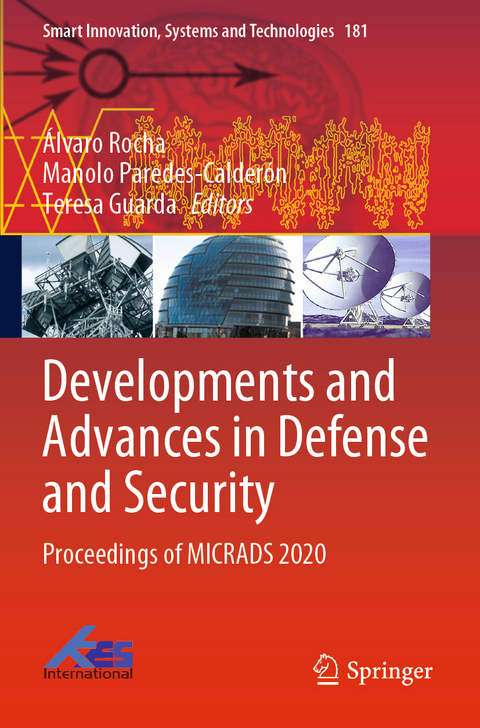
Developments and Advances in Defense and Security
Springer Verlag, Singapore
978-981-15-4877-2 (ISBN)
This book gathers the proceedings of the Multidisciplinary International Conference of Research Applied to Defense and Security (MICRADS), held at the Eloy Alfaro Military Academy (ESMIL) in Quito, Ecuador, on May 13–15,2020. It covers a broad range of topics in systems, communication, and defense; strategy and political–administrative vision in defense; and engineering and technologies applied to defense. Given its scope, it offers a valuable resource for practitioners, researchers, and students alike.
Álvaro Rocha holds the title of Honorary Professor, and holds a D.Sc. in Information Science, Ph.D. in Information Systems and Technologies, M.Sc. in Information Management, and Bachelor in Computer Science. He is a Professor of Information Systems at the University of Coimbra, researcher at CISUC (Centre for Informatics and Systems of the University of Coimbra), and a collaborator researcher at both LIACC (Laboratory of Artificial Intelligence and Computer Science) and CINTESIS (Center for Research in Health Technologies and Information Systems). His main research interests are information systems planning and management, maturity models, information systems quality, online service quality, intelligent information systems, software engineering, e-Government, e-Health, and information technology in education. He is also President of AISTI (the Iberian Association for Information Systems and Technologies), Chair of the IEEE Portugal Section Systems, Man, and Cybernetics Society Chapter, and Editor-in-Chief of both JISEM (Journal of Information Systems Engineering & Management) and RISTI (Iberian Journal of Information Systems and Technologies). Moreover, he has served as Vice-Chair of Experts for the European Commission’s Horizon 2020 program, and as an Expert at the Government of Italy’s Ministry of Education, Universities and Research, at the Government of Latvia’s Ministry of Finance, and at the Government of Mexico's National Council of Science and Technology. Manolo Paredes-Calderón was born in Ambato, Ecuador, in September 1978. He went to the “Eloy Alfaro” Military Academy, where he graduated in 2000 as an Army Second Lieutenant with a Bachelor in Military Sciences. Later, he obtained his Engineering degree in Electronics and Telecommunications at the Polytechnic Army School ESPE University. He obtained his Master of Science in Electronic Engineering from the Military Institute of Engineering IME in Rio de Janeiro, Brazil. His areas of expertise include digital signal processing and radio signal propagation. He is currently the Director of the CICTE Military Applications Research Center and a Professor at the Department of Electrical, Electronics and Telecommunications,ESPE University of the Armed Forces. Teresa Guarda received her Ph.D. in Systems and Information Technologies from Minho Universityin 2015. She is currently a researcher at the ALGORITMI Research Centre,Minho University, Portugal,where she is a member of the Intelligent Data Systems (IDS) research team and the Information Systems and Technologies (IST) R&D group. She has published extensively in the following areas: pervasive systems, marketing intelligence, crowdsourcing, data mining and knowledge discovery, Internet of Things, knowledge management, and cyber-security. She has also served as a reviewer for many prominent journals, and as a Professor and researcher at various academic institutions in Portugal since 1991; currently, she is the Director of the CIST Research Center of the Santa Elena Peninsula State University (Ecuador)and a Visiting Professor at the Security and Defense Department of Universidad de lasFuerzas Armadas (Ecuador).
Chapter 1. Cybersecurity Vulnerabilities in Colombia's Maritime Critical Infrastructure (MCI).- Chapter 2. Cyberspace and innocent passage: regulations for the security of the coastal state.- Chapter 3. Security versus usability in e-government: insights from the literature.- Chapter 4. Ackermann UGV with 2D mapping for unknown environments.- Chapter 5. Visual-based real time detection using neural networks and Micro-UAVs for military operations.- Chapter 6. Visual and inertial data based virtual localization for urban combat.- Chapter 7. Kinect and manipulator-based sample collection system for military robot.- Chapter 8. Autonomous Navigation based on proportional controller with GPS setpoint for UAV in external environments.- Chapter 9. Monte Carlo based localization for kidnapped robot problem.- Chapter 10. The automatic people counting in crowded scenes with drones applied to the parades that took place on October 20, 2019 in Ecuador.
| Erscheinungsdatum | 14.05.2021 |
|---|---|
| Reihe/Serie | Smart Innovation, Systems and Technologies ; 181 |
| Zusatzinfo | 144 Illustrations, color; 46 Illustrations, black and white; XIV, 557 p. 190 illus., 144 illus. in color. |
| Verlagsort | Singapore |
| Sprache | englisch |
| Maße | 155 x 235 mm |
| Themenwelt | Informatik ► Theorie / Studium ► Künstliche Intelligenz / Robotik |
| Sozialwissenschaften ► Politik / Verwaltung | |
| Sozialwissenschaften ► Soziologie | |
| Technik | |
| ISBN-10 | 981-15-4877-3 / 9811548773 |
| ISBN-13 | 978-981-15-4877-2 / 9789811548772 |
| Zustand | Neuware |
| Informationen gemäß Produktsicherheitsverordnung (GPSR) | |
| Haben Sie eine Frage zum Produkt? |
aus dem Bereich


